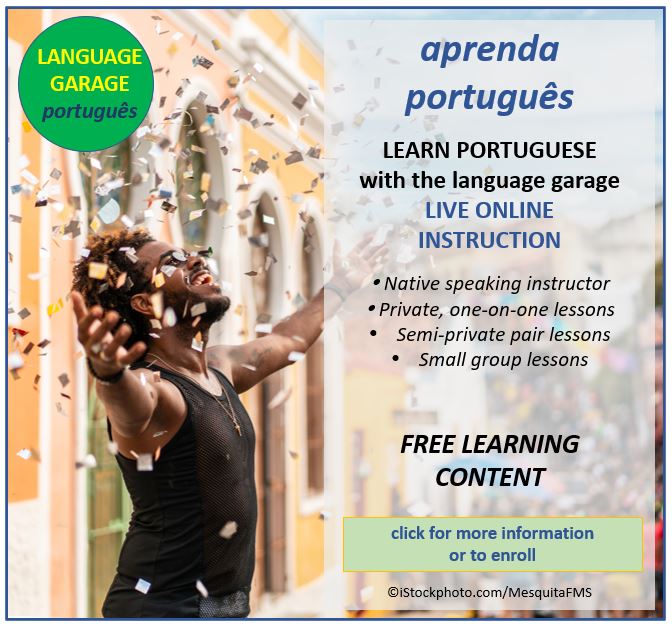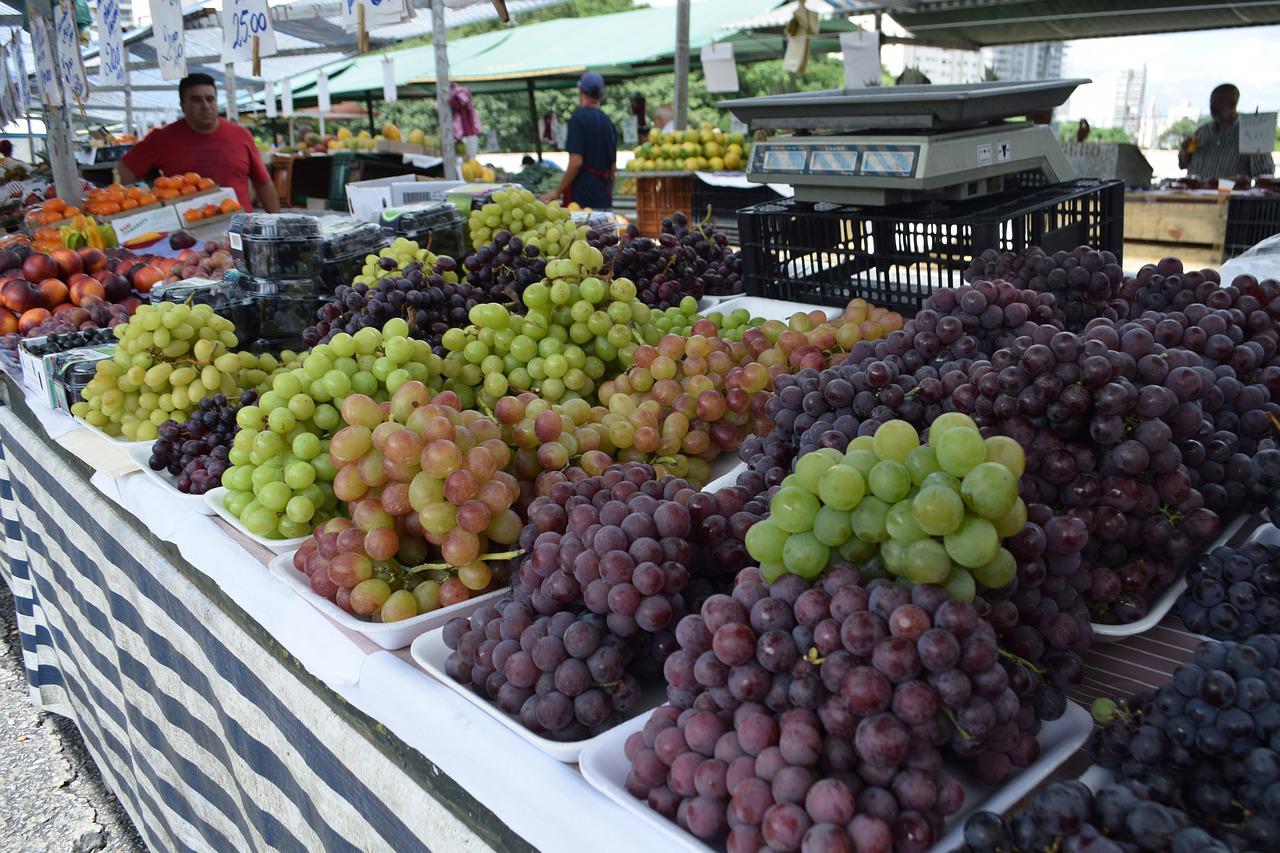In this post we’ll look at some key vocabulary related to food and drink.
Estou com fome! I’m hungry!
Let’s start with some basic expressions you may want to use.
- (Eu) Estou com fome.
I’m hungry. - Estou com sede.
I’m thirsty.

- Quero algo para comer.
I want something to eat. - Quero algo para beber.
I want something to drink. - Estou com vontade de comer uma comidinha / um lanche.
I feel like a snack.
O jantar está pronto! Dinner is ready!
The meals in Portuguese are o café da manhã breakfast, o almoço lunch, and o jantar dinner. A snack is uma comidinha or um lanche. Dessert is a sobremesa.
- O que tem para o café da manhã?
What’s for breakfast? - O que tem para o almoço?
What’s for lunch? - O que tem para o jantar?
What’s for dinner? - O que tem para a sobremesa?
What’s for dessert? - (Eu) Tomo café da manhã cedo.
I eat breakfast early. - (Eu) Almoço com os meus colegas.
I eat lunch with colleagues. - (Eu) Janto com a minha família.
I eat dinner with my family.
O que você está comendo? What are you eating?
Let’s see some basic vocabulary for food and beverages.
- o pão bread
- o arroz rice
- o macarrão pasta
- o macarrão com ovos noodles
- a carne meat
- o frango chicken
- a carne bovina beef
- a carne de porco pork
- o presunto ham
- o cordeiro lamb
- o peixe fish
- os frutos do mar seafood
- o camarão shrimp
- a lagosta lobster
- o caranguejo crab
- a lula squid
- o molusco clam
- o tofu tofu
- os vegetais vegetables
- o tomate tomato
- a cebola onion
- o alho garlic
- a alface lettuce
- o espinafre spinach
- o aspargo asparagus
- o repolho cabbage
- o cogumelo mushroom
- o pepino cucumber
- o pimentão pepper (as in bell)
- a pimenta chili pepper
- a fruta fruit
- a maçã apple
- a pera pear
- o pêssego peach
- a laranja orange
- o limão siciliano lemon
- o limão lime
- a uva grape
- o morango strawberry
- a banana banana
- a noz nut
- o amendoim peanut
- a semente seed
- o trigo wheat
- o cereal cereal
- o sal salt
- a pimenta do reino pepper
- o sésamo sesame
- o mel honey
- o açúcar sugar
- o molho de soja soy sauce
- o ovo egg
- o leite milk
- o queijo cheese
- a manteiga butter
- a água water
- o chá tea
- o café coffee
- o vinho wine
- a cerveja beer
- o leite de soja soy milk
- o sorvete ice cream
- o bolo cake
- a torta pie
- a bolacha cookie
- o doce candy
- comer to eat
- beber to drink
- cozinhar to cook
- experimentar to taste
- Como muito arroz.
I eat a lot of rice. - Você toma café ou chá de manhã?
Do you drink tea or coffee in the morning? - Você cozinha muito bem.
You cook very well!
Me passa um guardanapo, por favor? Could I have a napkin, please?
Some important vocabulary: o prato plate, a tigela bowl, a faca knife, a colher spoon, o garfo fork, os pauzinhos chopsticks, a xícara cup, o copo glass, o guardanapo napkin.
- Poderia me dar um guardanapo / um garfo / uma faca/ uma colher / uns pauzinhos?
Could I have a napkin/fork/knife/spoon/chopsticks? - Poderia me dar um copo de água?
Could I have a glass of water? - Onde estão os garfos, as facas e as colheres?
Where are the forks, knives, and spoons? - Os garfos, as facas, e as colheres estão na gaveta.
The forks, knives, and spoons are in the drawer. - Os copos limpos estão no armário.
The clean glasses are in the cabinet. - As xícaras de café estão na prateleira.
The coffee cups on are the shelf. - Me passa um guardanapo, por favor?
Could I have a napkin, please? - Por favor, ponha os pratos limpos no armário.
Please put the clean plates in the cabinet.
Como está a sua comida? How’s your food?
Let’s close with some key vocabulary that you can use to talk about your food: delicioso/a delicious, salgado/a salty, doce sweet, amargo/a bitter, azedo/a sour.
- Está delicioso/a.
It’s delicious. - Está ótimo/a.
It’s great. - Está comida é/ está excelente.
This food is excellent. - Está quente demais.
It’s too hot. - Está frio/a demais.
It’s too cold. - Está doce demais.
It’s too sweet. - Está salgado/a demais.
It’s too salty. - Está sem gosto / sem graça.
It’s tasteless/bland. - Está cozido/a demais.
It’s overcooked. - Não está suficientemente cozido/a.
It’s undercooked. - Está oleoso/a / gorduroso/a.
It’s oily/greasy.
Do you want to learn Portuguese?
Check out our other posts on Portuguese language, Brazilian culture, and more. And if you’re looking for convenient and affordable live Portuguese lessons with a real teacher, check out The Language Garage Portuguese. Our lessons are given online in a virtual classroom, so it doesn’t matter where you live or work. We can come to you. And we have flexible options, with a free trial so that you can decide if there’s a fit. Check us out!




